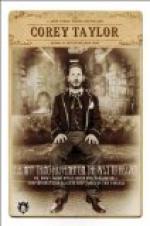With a spring that came apparently from the door opposite the stove near which he was standing Carmencita was by his side, and, swift movement following swift movement, the lid of the stove was lifted, wood put in, the kettle of water put on, and the table drawn farther out in the floor. A moment more the lamp was lighted, her father’s coat and hat in place, his chair drawn up to the now roaring fire; then, with speculation in her eyes, she stood for half a moment, hands on hips, looking first at Van Landing and then at the cupboard in the corner.
For the first time he saw well the slender little body out of its long, loose coat, the heavy, brown curls which tumbled over the oval face, the clear eyes that little escaped, so keen was their quality, and the thin legs with their small feet in large shoes, and as he looked he smiled.
“Well,” he asked, “can I help you? You seem very uncertain.”
“I am. Put your hat and coat over there”—she pointed to the covered cot close to the wall—“then come back and tell me.”
He did as directed and, hands in pockets, stood again in front of her. “Is”—his face whitened—“is it about Miss Barbour? Can you send her word?”
“Send now? I guess not!” On tiptoes the child looked for something on the mantel-piece. “We haven’t had supper yet, and I’m so hungry I could eat air. Besides, she has a class to-night—The Little Big Sisters. I’m one when I can go, but I can’t go often.” She waved her hand in the direction of her father. “I’ll send for her ’bout half past nine. Which do you like best, sardines with lemon on ’em, or toasted cheese on toast with syrup afterward? Which?”
The tone was one of momentous inquiry. Miss Barbour’s coming was a matter that could wait, but supper necessitated a solemn decision which must be made at once. Hands clasped behind her, the blue eyes grew big with suspense, and again she repeated, “Which?”
“I really don’t know. Both are very good. I believe I like sardines better than—Oh no, I don’t.” He had caught the flicker of disappointment in the anxious little face. “I mean I think toasted cheese the best thing to eat that’s going. Let’s have that!”
“All right.” With another spring the child was at the cupboard, and swiftly she went to work. “Read to father, won’t you?” she called, without looking round. “In that magazine with the geranium leaf sticking out is where I left off. You’ll have to read right loud.”
Drawing his chair close to the lighted lamp, Van Landing took his seat near the blind musician, and for the first time noticed the slender, finely formed fingers of the hands now resting on the arms of the chair in which he sat; noticed the shiny, well-worn coat and the lock of white hair that fell across the high forehead; saw the sensitive mouth; and as he looked he wondered as to the story that was his. An old one, perhaps. Born of better blood than his present position implied, he had evidently found the battle of life more than he was equal to, and, unfit to fight, he had doubtless slipped down and down in the scale of human society until to-day he and his child were dwellers on the borderland of the slums.




